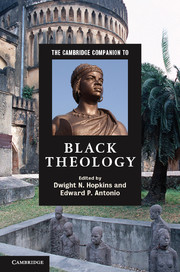Book contents
- Frontmatter
- Part I Introduction
- Part II Themes in black theology
- 6 God
- 7 Jesus in black theology: the ancient ancestor visits
- 8 Black theology and the Holy Spirit
- 9 Black theology and human purpose
- 10 Theology's great sin: silence in the face of white supremacy
- 11 Theodicy: “De Lawd knowed how it was.” Black theology and black suffering
- 12 Black theology and the Bible
- 13 Protestant ecclesiology
- 14 Roman Catholic ecclesiology
- 15 Dignity and destiny: black reflections on eschatology
- Part III Global expressions of black theology
- Further reading
- Index
- Other titles in the series
10 - Theology's great sin: silence in the face of white supremacy
from Part II - Themes in black theology
Published online by Cambridge University Press: 28 September 2012
- Frontmatter
- Part I Introduction
- Part II Themes in black theology
- 6 God
- 7 Jesus in black theology: the ancient ancestor visits
- 8 Black theology and the Holy Spirit
- 9 Black theology and human purpose
- 10 Theology's great sin: silence in the face of white supremacy
- 11 Theodicy: “De Lawd knowed how it was.” Black theology and black suffering
- 12 Black theology and the Bible
- 13 Protestant ecclesiology
- 14 Roman Catholic ecclesiology
- 15 Dignity and destiny: black reflections on eschatology
- Part III Global expressions of black theology
- Further reading
- Index
- Other titles in the series
Summary
Dietrich Bonhoeffer and Martin Luther King, Jr. were two of the most outspoken Christian theologians against injustice and suffering in the twentieth century. Bonhoeffer, a German Lutheran, was hanged in a Nazi prison at Flossenburg in Bavaria, on April 9, 1945. King, an African American Baptist, was assassinated while fighting for garbage workers in Memphis, Tennessee, on April 4, 1968. Both were 39 years old at the time of their deaths. What distinguished Bonhoeffer and King from most theologians was their refusal to keep silent about the great moral issues of their time and situation, and their courage to fight social and political evils in their societies that challenged religious meaning. They opposed Nazi and American racism fiercely – knowing that it would probably lead to their deaths. “When Christ calls a man,” Bonhoeffer said, “he bids him come and die.” King was just as prophetic and courageous: “If physical death is the price I must pay to free my white brothers and sisters from the permanent death of the spirit, then nothing could be more redemptive.” The lives and writings of Bonhoeffer and King tell us far more about what it means to be a Christian and a theologian than all the great tomes in the history of theology. Their martyrdom placed Christian identity at the foot of the Cross of Jesus and in the midst of oppressed people fighting for justice and freedom.
- Type
- Chapter
- Information
- The Cambridge Companion to Black Theology , pp. 143 - 155Publisher: Cambridge University PressPrint publication year: 2012
- 2
- Cited by

